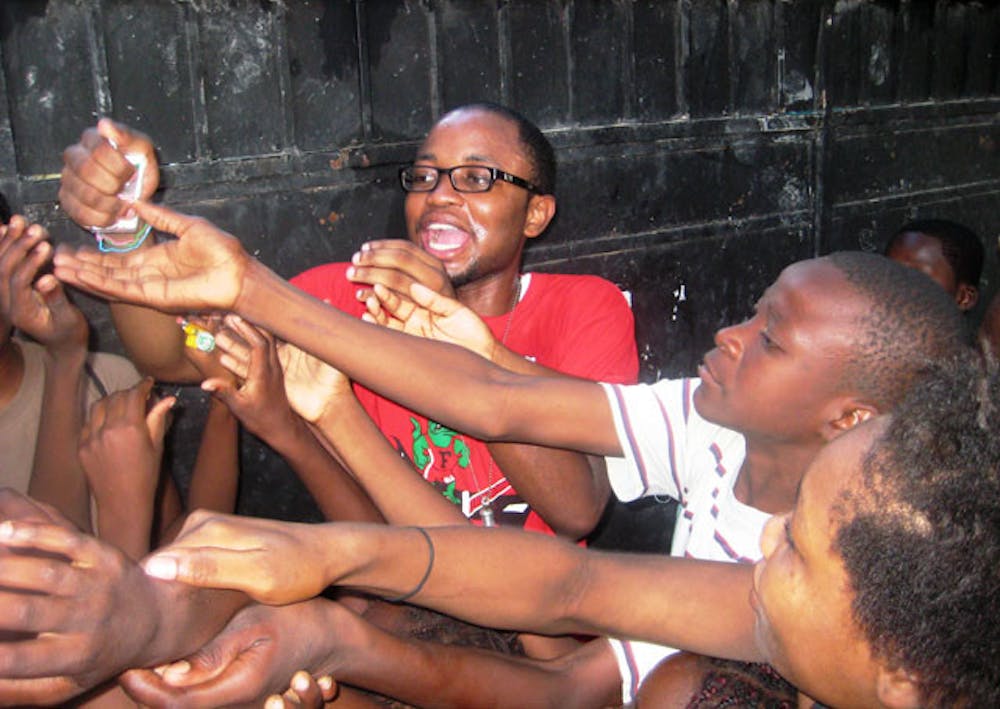Editor's note: This is the second installment of a four-part series. To read other parts of this story, please click the links below.
The Long Flight Home
Eight months have elapsed since the tectonic plates budged underneath Haiti. The streets, once strewn with the crushed bodies of the young and old, are now alive with the sounds of sputtering engines and shrill horns. Survivors continue to rise at dawn to milk the cows, feed the livestock and till a rough soil.
Yet there is more work to be done beyond laying a few bricks or drilling a well that will yield water without poisonous microbes. A nation's identity must be bolstered. Faith and hope can't feed swollen stomachs or fund the education of children, many of whom cannot afford the steep tuition of $10 USD, but it may help spark a step toward resolution.
For the 12 people of First Assembly who will make a five-day journey down to the small Caribbean nation, this will be their mission. The success or failure of their trip won't lie in how much they open their wallets but by how much they open their hearts.
For the Rev. George Dumaine, a pastor at First Assembly and the voice behind the music at the January vigil, this will be a trip that has been in the making for generations. His ancestors, missionaries from Venezuela, came to Haiti at the end of the 19th century where they mixed with the natives, made a home for their sons and daughters and built a church that still stands. Currently, Dumaine has hundreds of uncles, aunts, cousins and distant relatives living in Haiti, many of whom he only knows as passing names spoken by family.
Yet for Dumaine, a UF graduate whose family refers to him as "the little American," his first trip to Haiti will not be one for family reunions. His work will leave him no time for visits. There are families without homes, children without food and some, possibly, without hope.
"When the earthquake hit, I wasn't concerned for my family because I knew people would look after them," he said. "I was more concerned for the orphans and other people who didn't have a family to look after them."
While the decision to go to Haiti and help his "other family" wasn't a hard one, the preparation was another matter. Dumaine said he never doubted God's existence in the face of tragedy but still faced difficult moments when he couldn't help but ask what God had in store for Haiti.
"It's kind of like when a coach makes a call that you have no idea why he did and you're left thinking to yourself ‘What's the plan?'" he said.
In the weeks leading up to the trip, Dumaine spent hours alone reflecting on scripture and praying alone. His pleas were not so much for personal safety but for strength to provide a positive effect on the lives of Haitians. He did not want to be viewed as another American getting in the way. By the time he boards his flight to Port-au-Prince, Dumaine has no doubt that where he is going is where he needs to be.
"I'm trusting that the coach knows best," he said.
Sitting alongside Dumaine on the flight is Sarah Fandler, a Gainesville resident and one of the 12 aid workers. With a skin tone that would make Caribbean sun beams salivate and a "Leave it to Beaver" voice chipper and honed, Fandler looks more like a misplaced human macadamia nut than a missionary. Yet for the housewife and mother of three, there is no one more qualified to go. Growing up, Fandler traveled to numerous Third World countries with her Christian missionary parents, encountering some of the bleakest conditions a person could live in. While girls her age picked out dresses for the winter formal, Fandler spent her time evangelizing in Thailand, Malaysia and Indonesia, where those living on $1 a day were considered "doing well."
"A lot of times it's so overwhelming you don't know how to be effective," she recalled. "Your heart's going to break even if you have the Lord in your heart-you have to be pretty dead inside for it not to."
One would think that having undergone those experiences at such a fragile age, and the prospect of raising three children under the age of seven, would be enough motivation to stay away from anywhere resembling the Third World. But, it didn't take long for Fandler to know what she had to do.
"I didn't think I was being a good mother if I didn't set an example for my children of sacrificing to others."
Instead of facing a litany of complaints and tantrums, her young family gave their blessing and more.
"Mommy, take me with you. I want to go with you," pleaded Fandler's 6-year-old son Daniel. When she explained to him that a ravaged country festering with disorder wasn't a place for little children, he quietly went to his room only to return a few minutes later with his arms full of toys and clothes.
As the hours between Florida and Haiti passed, Dumaine and Fandler couldn't help but feel a sense of anticipation at going to a new country.
Georges had a different take.
Having lived in Haiti until he was 12, Sky dreaded the thought of seeing his family's homeland - his homeland - reduced to rubble. He heard the stories of families living in overcrowded, makeshift tents on the outskirts of cities and of children not going to school out of fear that roof and walls might cave in.
"I kept telling myself ‘I'm not going to Haiti;' I'm not ready for this," he said. "How do I relate?"
But there were children who needed him. These doubts, he told himself, were normal and would wash away once he saw the soccer games in the street and heard the traditional songs and dances that welcomed travelers at the airport.
A clear sky and a busy airport filled with men in business suits carrying expensive luggage gave assurances that all was well. Yet as he walked through the winding hallways, Georges couldn't shake the feeling that something was off.
As he made his way for the door, it hit him-the songs never came.
Things, he thought, are going to be different.
For the first part, click here.
For the third part, click here.
For the fourth part, click here.





